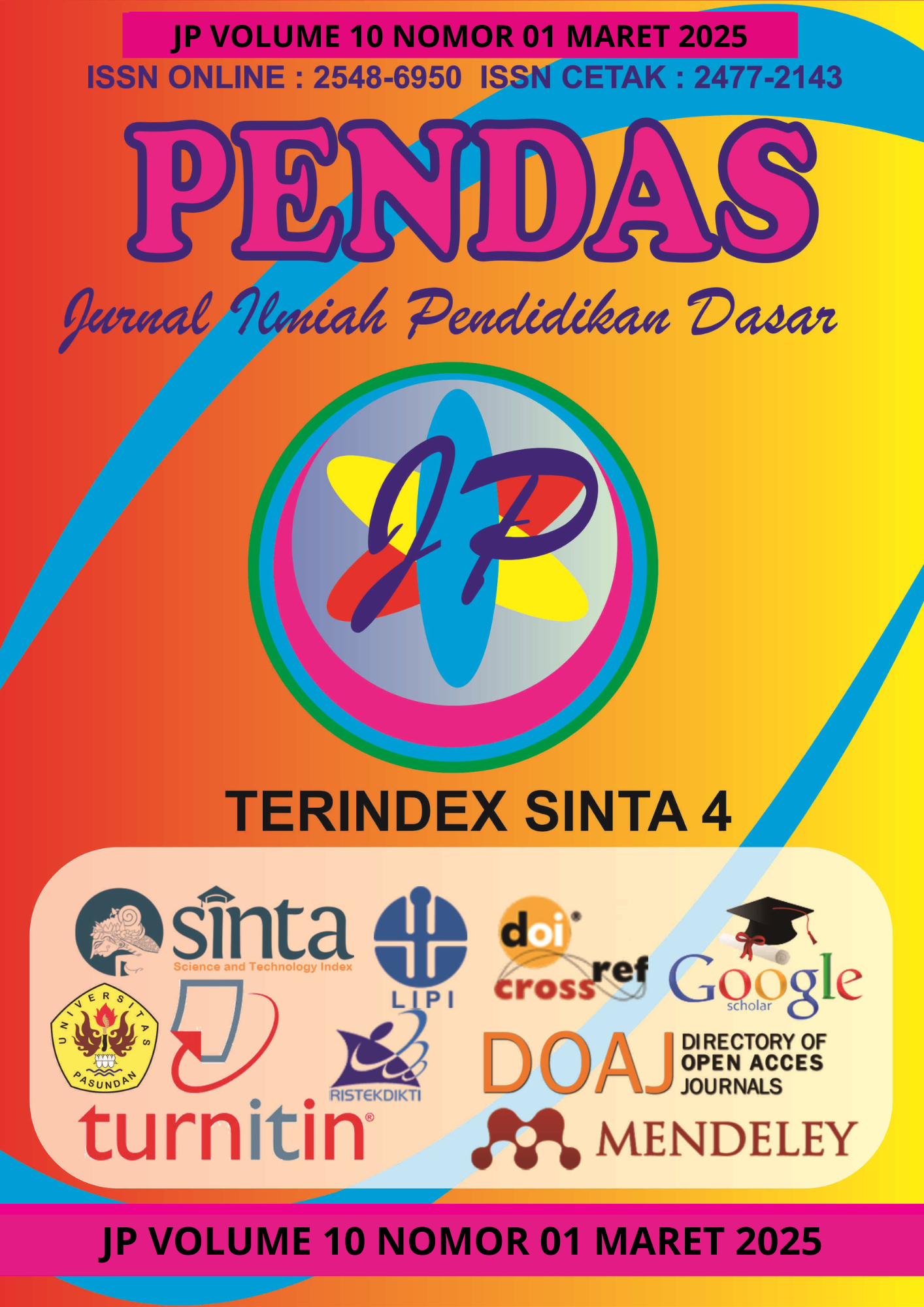THE ROLE OF PRAGMATICS COMPETENCE IN SUPPORTING STUDENT'S SELF-ESTEEM IN ENGLISH LANGUAGE LEARNING
DOI:
https://doi.org/10.23969/jp.v10i01.23384Keywords:
english language learning, pragmatic competence, students’ self-esteemAbstract
This research investigates the role of pragmatic competence in supporting students' self-esteem in English language learning, employing a Mixed Methods approach with an Exploratory Sequential Mixed-Methods Design. The study was conducted with 80 students from Secondary School. The first phase utilized a quantitative Likert scale questionnaire to measure the relationship between pragmatic competence and self-esteem. The second phase involved qualitative narrative analysis from interviews with students and teachers to gain deeper insights. Results indicate that students with higher pragmatic competence, such as using politeness strategies and contextually appropriate responses, demonstrated increased self-esteem. Internal factors such as motivation and past experiences, and external factors including family support and teacher feedback, were found to influence this relationship. The study highlights the importance of enhancing pragmatic competence through collaborative learning, self-reflection, and creating a supportive environment to boost students' confidence and willingness to engage in English language activities. This research provides recommendations for integrating pragmatic competence into English teaching to promote both language skills and self-esteem.
Downloads
References
Ahmed, E. A. M. (2022). The Effects of Pragmatics Competence in EFL University Learners. Open Journal of Applied Sciences, 12(10), 1618–1631. https://doi.org/10.4236/ojapps.2022.1210110
Amaliah. (2024). A Review Article of the Pragmatics Competence in EFL Learning Context. Al Qalam: Jurnal Ilmiah Keagamaan Dan Kemasyarakatan, 18(1), 776. https://doi.org/10.35931/aq.v18i1.3163
Anna, D., & Guban-Caisido, D. (2020). Self-Esteem and Language Learning: Empirical Evidence From The Past Two Decades. 4(2). http://jurnal.unsil.ac.id/index.php/tlemc/index
Atasheva, G. (2024). The Importance of English Language In The Formation Of Cross-Cultural Relations. American Journal of Philological Sciences, 4(2), 58–62. https://doi.org/10.37547/ajps/Volume04Issue02-11
Dörnyei, Z., & Ushioda, E. (2021). Teaching and Researching Motivation: Third Edition. https://www.routledge.com/Applied-Linguistics-in-Action/book
Firmansyah, D. (2022). Social Learning Theory: Cognitive and Behavioral Approaches. https://doi.org/10.55927/jiph.v1i3.2317
Hamdani, B. (2019). Pragmatic Competence Among EFL Learners.
Kuswantoro, A. V., & Novita, D. (2024). Overcoming Speech Anxiety in English Language Classrooms. Pubmedia Jurnal Pendidikan Bahasa Inggris, 1(3), 10. https://doi.org/10.47134/jpbi.v1i3.419
Malokani et al. (2023). The Correlation Between English Language Proficiency and Perceived Career Opportunities.
Naoko Taguchi. (2019). The Routledge Handbook of Second Language Acquisition and Pragmatics. https://www.routledge.com/Second-
Noviyenty, L. (2023). Non-Native EFL Lecturers’ Strategies in Building Their Pragmatics Competence. In Journal of English Education and Teaching (Vol. 7, Issue 2).
Nurdiana. (2019). Understanding Pragmatics and Pragmatic Competence in ELT Materials. http://journal.ubm.ac.id/xxx/xxx
Salehi, S., Tarameshkou, M., Mirahmadi, S., Hashemnia, S., & Hassansheikhi, M. (2022). The Relationship of Pragmatic Language Competency and Self-Esteem in Hearing-Impaired Children. Journal of Arak University of Medical Sciences, 25(3), 464–473. https://doi.org/10.32598/jams.25.3.6900.1
Shrishthy. (2023). Importance English language for global understanding and for global education. Importance English language for global understanding and for global education (Vol. 7). www.ijrti.org
Yang, H., & Lian, Z. (2023a). Ideal L2 Self, Self-Efficacy, and Pragmatic Production: The Mediating Role of Willingness to Communicate in Learning English as a Foreign Language. Behavioral Sciences, 13(7). https://doi.org/10.3390/bs13070597
Yang, H., & Lian, Z. (2023b). Ideal L2 Self, Self-Efficacy, and Pragmatic Production: The Mediating Role of Willingness to Communicate in Learning English as a Foreign Language. Behavioral Sciences, 13(7). https://doi.org/10.3390/bs13070597
Yousefabadi, M. M., & Ghafournia, N. (2023). The Impact of Self-Confidence on English Language Proficiency.
Dawn, Hawkins. (2019). Describing a single sample. doi: 10.1093/hesc/9780198807483.003.0003
Alamer, A., & Lee, J. (2024). Language achievement predicts anxiety and not the other way around: A cross-lagged panel analysis approach. Language Teaching Research, 28(4), 1572–1593. https://doi.org/10.1177/13621688211033694
Widodo, U., & Winarti, A. (2021). FAKTOR-FAKTOR MOTIVASI DALAM PEMBELAJARAN BAHASA INGGRIS.
Ellis, R., & Shintani, N. (2017). Exploring Language Pedagogy through Second Language Acquisition Research. Routledge.
Nation, I. S. P. (2017). Learning Vocabulary in Another Language (2nd ed.). Cambridge University Press.
Bandura, A. (2017). Self-efficacy: The Exercise of Control. W.H. Freeman and Company.
Brown, H. D., & Lee, H. (2019). Teaching by Principles: An Interactive Approach to Language Pedagogy. Pearson.
Vygotsky, L. S. (2018). Mind in Society: The Development of Higher Psychological Processes. Harvard University Press.
Lyster, R. (2018). Learning and Teaching Languages Through Content: A Student-Centered Approach. John Benjamins Publishing Company.
Richards, J. C., & Rodgers, T. S. (2017). Approaches and Methods in Language Teaching. Cambridge University Press.
Deci, E. L., & Ryan, R. M. (2017). Self-determination theory: Basic psychological needs in motivation, development, and wellness. Guilford Press.
Windi, Windi., Maman, Suryaman. (2022). Improving Students’ Ability in Writing Descriptive Text Through Contextual Teaching and Learning Approach. Jurnal ilmiah profesi pendidikan, 7(1):151-155. doi: 10.29303/jipp.v7i1.399
Bandura, A. (2017). Self-efficacy: The Exercise of Control. W.H. Freeman and Company.
Brown, H. D., & Lee, H. (2019). Teaching by Principles: An Interactive Approach to Language Pedagogy. Pearson.
Rosenberg, M. (1965). Society and the Adolescent Self-Image. Princeton University Press.
Vygotsky, L. S. (2018). Mind in Society: The Development of Higher Psychological Processes. Harvard University Press.
Downloads
Published
Issue
Section
License
Copyright (c) 2025 Pendas : Jurnal Ilmiah Pendidikan Dasar

This work is licensed under a Creative Commons Attribution 4.0 International License.














































